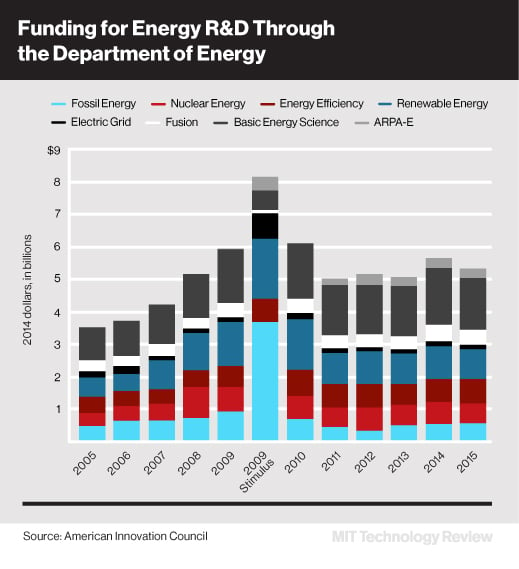U.S. Commitment to Energy Research Still Insufficient, Say Business Leaders
Five years ago the American Innovation Council, a group of six prominent business leaders including Bill Gates and GE’s CEO Jeffrey Immelt, published a “business plan for America’s energy future,” which included recommended investments the group said would “unleash America’s technological potential” in a way that would reduce our reliance on fossil fuels.
At the time it didn’t feel like such a stretch. Excitement about new energy technologies was riding high, thanks in large part to the big infusion of stimulus funding the year before. Five years later, there has been so little progress that the group’s second report, published this week, reiterates several of the exact same recommendations from five years ago.
In 2009 and 2010, federal funding for energy R&D through the Department of Energy reached $6 billion (in 2014 dollars)—the highest levels seen during the past decade. But that was still $10 billion less than the government should be spending, according to the original report. In subsequent years, annual funding dropped back to around $5 billion, where it has stayed.
The new report makes the same $16 billion per year recommendation, and argues that $1 billion of that should be allocated yearly to the Advanced Research Projects Agency-Energy (ARPA-E), which pursues high-risk, high-reward research. The council gave that same advice five years ago, but since getting $400 million from the 2009 stimulus package, funding for ARPA-E hasn’t surpassed $300 million.
The chart below, created by the authors of the new report, breaks down DOE energy R&D funding since 2005. The 2009 stimulus has its own bar.

Federal funding is “the only viable avenue of support for energy technology research and large-scale demonstration projects,” the authors note. However, the government remains beholden to a system based on annual appropriations, and thus lacks consistency and long-term vision. “A stable and dedicated funding regime is critical for both effective and efficient R&D decision-making.”
Keep Reading
Most Popular
Large language models can do jaw-dropping things. But nobody knows exactly why.
And that's a problem. Figuring it out is one of the biggest scientific puzzles of our time and a crucial step towards controlling more powerful future models.
The problem with plug-in hybrids? Their drivers.
Plug-in hybrids are often sold as a transition to EVs, but new data from Europe shows we’re still underestimating the emissions they produce.
Google DeepMind’s new generative model makes Super Mario–like games from scratch
Genie learns how to control games by watching hours and hours of video. It could help train next-gen robots too.
How scientists traced a mysterious covid case back to six toilets
When wastewater surveillance turns into a hunt for a single infected individual, the ethics get tricky.
Stay connected
Get the latest updates from
MIT Technology Review
Discover special offers, top stories, upcoming events, and more.